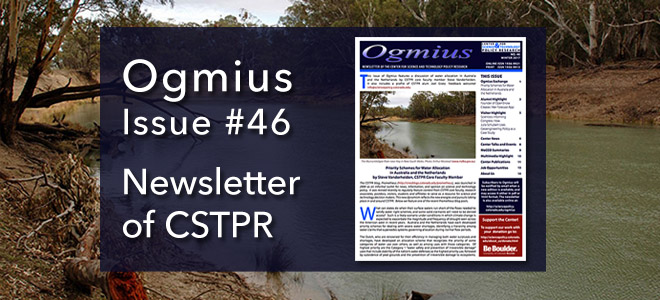
Ogmius
Issue #46, Winter 2017
This issue of Ogmius features a discussion of water allocation in Australia and the Netherlands by CSTPR core faculty member Steve Vanderheiden. It also includes a profile of CSTPR alum Joel Gratz and CSTPR Visitor Julia Schubert. Feedback welcome! info@sciencepolicy.colorado.edu
Priority Schemes for Water Allocation in Australia
and the Netherlands
What can states do when their surface waters run short of the flows needed to satisfy water right schemes, and some valid claimants will need to be denied access? Such is a likely scenario under conditions in which climate change is expected to exacerbate the magnitude and frequency of drought seen across the American west in recent years. Australia and the Netherlands have each developed priority schemes for dealing with severe water shortages, identifying a hierarchy among water claims that supersedes systems governing allocation during normal flow periods.
The Dutch, who are renowned for their efficiency in managing both water surpluses and shortages, have developed an allocation scheme that recognizes the priority of some categories of water use over others, as well as among uses with those categories. Of highest priority are the Category 1 “water safety and prevention of irreversible damage” uses that include stability of the nation’s water defenses as the highest priority use, followed by subsidence of peat grounds and the prevention of irreversible damage to ecosystems. Since all three are non-extractive uses, the national legal recognition of this category as of highest value requires that some water be left within river basins even in cases of severe drought, prioritizing these to all extractive uses. Read more …
Founder of OpenSnow Creates 14er Forecast App
Meteorologist Joel Gratz takes weather prediction off the beaten path. Gratz, founder of the skier-beloved forecast company OpenSnow and alumnus of the Center for Science and Technology Policy Research (CSTPR) at the University of Colorado Boulder, recently created a new app for iPhones that provides forecasts for hikers of Colorado’s highest peaks. Gratz graduated from CU Boulder in three years with both an M.S. in Environmental Studies and an MBA. His new app, OpenSummit, delivers hourly temperature, wind, precipitation and lightning forecasts for every mountain in Colorado over 14,000 feet. The app is also synced with Instagram, so users can see for themselves the recent conditions at each summit. OpenSummit launched in September 2016, so summer 2017 will be its first ever 14er season.
“This was always kind of in the back of my mind, to help with forecasts for outdoorsy folks, but it’s just until recently that we’ve had the time and money to put into a new app and a new service,” says Gratz. “Eventually we want to provide forecasts for all the trails, not just 14ers.” Read more …
Scientists Informing Congress: How Julia Schubert Uses Geoengineering Policy as a Case Study
How do you study the ways in which scientific expertise is brought into the process of policy making? And how do you capture its impact? One possibility is conducting a case study of policy-making in the works that is heavily dependent on politicians reaching out to scientists for their expertise. Julia Schubert, visiting scholar with the CIRES Center for Science and Technology Policy Research (CSTPR), is doing exactly this.
Schubert comes to CSTPR from the Forum Internationale Wissenschaft in Bonn, Germany on a Fulbright Fellowship. As a doctoral student and sociologist, she is interested in the relationship between political entities and the types of scientific expertise they draw on. For her dissertation, geoengineering in United States politics serves as the empirical case study. Read more …

